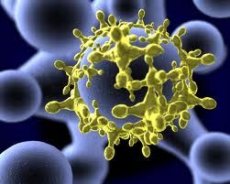New publications
US scientists have developed a universal antiviral drug
Last reviewed: 30.06.2025

All iLive content is medically reviewed or fact checked to ensure as much factual accuracy as possible.
We have strict sourcing guidelines and only link to reputable media sites, academic research institutions and, whenever possible, medically peer reviewed studies. Note that the numbers in parentheses ([1], [2], etc.) are clickable links to these studies.
If you feel that any of our content is inaccurate, out-of-date, or otherwise questionable, please select it and press Ctrl + Enter.

A protein antiviral complex developed at the Massachusetts Institute of Technology (USA) successfully eliminates 15 types of viruses, from influenza to dengue fever. Researchers claim that the resulting drug can "crack" almost any virus.
While we have a wide range of antibiotics to combat bacterial infections, unfortunately we cannot boast of such successes in the case of viruses. In most cases, the matter is limited to immunomodulators that support our immunity while the body itself fights the viral invasion. There are also a number of drugs aimed at specific viruses, such as viral protease inhibitors designed to combat HIV infection. But the number of such drugs is too small, and viruses tend to adapt to them extremely quickly.
Meanwhile, a team of researchers from the Massachusetts Institute of Technology claims that they have succeeded in creating a universal antiviral drug; the scientists published the results of their work in the online publication PLoS ONE.
The mechanism of action of the newly invented drug is based on some common features of viral biology. The reproduction of many pathogenic viruses includes a stage when a long double-stranded molecule of matrix RNA appears in the host cell. Such RNA is a characteristic sign of a viral infection, since animal cells do not use long double-stranded matrix RNA. The cell itself usually detects viral molecules: recognition of such RNA by a special cellular protein leads to the activation of several molecular events aimed at stopping the reproduction of the virus. But viruses have learned to suppress this protective reaction at one stage or another.
The researchers came up with the idea of combining a protein that recognizes double-stranded viral RNA with proteins that trigger apoptosis, or programmed cell death, in the cell. The suicide program is usually activated when there is extensive damage to the genome and the cell is at risk of cancerous transformation. In this case, the scientists attempted to use apoptosis to combat the viral infection.
The drug was called DRACO, which, however, has nothing to do with Harry Potter and stands for Double-stranded RNA Activated Caspase Oligomerizers. The DRACO complex has a special peptide "key" that allows it to pass through the cell membrane. Then, if there is a virus in the cell, one end of the complex binds to the viral RNA, and the other activates caspases - apoptotic enzymes. If there is no virus in the cell, the apoptotic signal is not activated, and DRACO can safely leave the cell.
The researchers tested their potion on 11 types of animals and human cells and found no toxic side effects. However, the drug successfully eliminated 15 types of viruses, including the flu virus and the dengue fever virus. In animal tests, a mouse infected with the H1N1 flu virus completely got rid of the infection.
In theory, DRACO can handle any virus that has the notorious double-stranded RNA in its life cycle, meaning it is “tuned” to a huge number of viral pathogens. (So it would probably be useless against the DNA-containing herpes virus.) It would be much more difficult for viruses to develop resistance to such a drug, since we are talking about an artificial protein complex.
Researchers hope the drug will be widely used after it passes clinical trials.

 [
[